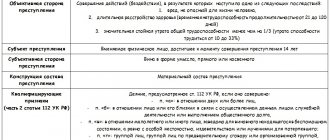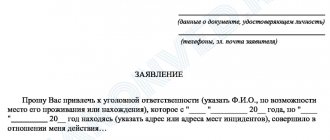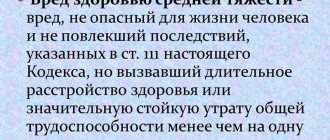Lawyer under Art. 112 of the Criminal Code of the Russian Federation in Krasnogorsk will provide the necessary assistance at any stage of the criminal process, starting from the stage of verification in accordance with Art. Art. 144 – 145 of the Code of Criminal Procedure of the Russian Federation (even before the initiation of a criminal case) and before the case is considered by the court.
Article 112 of the Criminal Code of the Russian Federation provides for liability for the intentional infliction of moderate harm to health, not dangerous to human life and not entailing the consequences specified in Article 111 of the Criminal Code of the Russian Federation, but causing a long-term health disorder or a significant permanent loss of general ability to work by less than one third.
Part one of this article belongs to the category of crimes of minor gravity, as it provides for a maximum penalty of imprisonment of up to three years. The second part already belongs to the category of crimes of medium gravity, an act under it is qualified if the following criteria are present: if the crime is committed against two or more persons, against a person or his relatives in connection with the performance of official activities by this person or the performance of a public duty, against a minor or other person, known to the perpetrator to be in a helpless state, as well as with special cruelty, bullying or torture for the victim, by a group of persons, a group of persons by prior conspiracy or an organized group, for hooligan reasons, for political, ideological, racial, national reasons or religious hatred or hostility or based on hatred or hostility towards any social group, using weapons or objects used as weapons. Part two art. 112 of the Criminal Code of the Russian Federation provides for a maximum penalty of up to five years in prison. CRIMINAL LAWYER call now: ☎ 8 (495) 532-75-40
Protection under Art. 112 of the Criminal Code of the Russian Federation Causing moderate harm to health
Defense in cases of intentional infliction of moderate harm to health in Krasnogorsk begins with a conversation with a criminal lawyer in Krasnogorsk, assessing the prospects and building a legal position. In some cases, for example, it is possible to re-qualify Art. 112 of the Criminal Code of the Russian Federation from part two to part one by excluding qualifying features, and this is a crime of minor gravity, providing for a less severe punishment. Decisive evidence in cases of this category, including, along with Art. 112 of the Criminal Code of the Russian Federation, and Art. Art. 111, 113, 114, 115, 116, 118 of the Criminal Code of the Russian Federation, is a forensic medical examination of the severity of harm to health. It is the expert opinion that directly influences the qualification of actions. In this case, it is important to pay attention to the state of health of the victim before violence was used against him, whether he had a history of any physiological characteristics predisposing to increased damage to health, for example, calcium deficiency, which leads to increased fragility of bones, difficulties with blood clotting, etc. .P. Another important issue is the cause-and-effect relationship between the occurrence of harm to health and the actions of the suspect/accused. An important role here is played by the moment when the harm to health occurred - before the use of violence, after the use of violence. If harm to the victim’s health occurred after the use of violent actions, then it is necessary to raise the question of finding out what exactly caused the harm to health by the actions of the accused or other factors, be it untimely and improper provision of medical care, the use of violence by other persons subsequently, etc.
What punishment threatens under Part 1 of Art. 112 of the Criminal Code of the Russian Federation if the fight was started by the victim?
Hello. Broke a man's jaw. The case was collected and sent to court. They will be judged under Article 112, Part 1. What will be the possible punishment in this case. He had no previous convictions. And the victim started the fight.
Lawyer Lebedev Z.S.
Good afternoon According to Part 1 of Article 112 of the Criminal Code, intentional infliction of moderate harm to health, not dangerous to human life and not entailing the consequences specified in Article 111 of this Code, but causing long-term health disorder or significant permanent loss of general working capacity of less than one third , - is punishable by restriction of freedom for a term of up to three years, or forced labor for a term of up to three years, or arrest for a term of up to six months, or imprisonment for a term of up to three years. According to Articles 61 and 62 of the Criminal Code, the following are recognized as mitigating circumstances: a) the commission of a crime of minor or moderate gravity for the first time due to a random combination of circumstances; b) the minority of the perpetrator; c) pregnancy; d) the presence of young children with the perpetrator; e) committing a crime due to a combination of difficult life circumstances or out of compassion; f) committing a crime as a result of physical or mental coercion or due to financial, official or other dependence; g) commission of a crime in violation of the conditions of legality of necessary defense, detention of the person who committed the crime, extreme necessity, justified risk, execution of an order or instruction; h) illegality or immorality of the behavior of the victim, which was the reason for the crime; i) confession, active assistance in solving and investigating a crime, exposing and prosecuting other accomplices in a crime, searching for property obtained as a result of a crime; j) provision of medical and other assistance to the victim immediately after the commission of a crime, voluntary compensation for property damage and moral harm caused as a result of the crime, and other actions aimed at making amends for the harm caused to the victim. When assigning a punishment, circumstances not provided for in the first part of this article may be taken into account as mitigating factors. If a mitigating circumstance is provided for by the relevant article of the Special Part of this Code as a sign of a crime, it in itself cannot be taken into account again when assigning punishment. In the presence of mitigating circumstances provided for in paragraphs “and” and (or) “k” of part one of Article 61 of this Code, and in the absence of aggravating circumstances, the term or amount of punishment cannot exceed two-thirds of the maximum term or amount of the most severe type of punishment provided for in the relevant article of the Special parts of this Code. In the case of concluding a pre-trial agreement on cooperation in the presence of mitigating circumstances provided for in paragraph “and” of part one of Article 61 of this Code, and in the absence of aggravating circumstances, the term or amount of punishment cannot exceed half the maximum term or amount of the most severe type of punishment provided for in the relevant article of the Special Part of this Code. The provisions of part one of this article do not apply if the corresponding article of the Special Part of this Code provides for life imprisonment or the death penalty. In this case, the punishment is imposed within the sanction of the relevant article of the Special Part of this Code. In the case of concluding a pre-trial agreement on cooperation, if the relevant article of the Special Part of this Code provides for life imprisonment or the death penalty, these types of punishment are not applied. In this case, the term or amount of punishment cannot exceed two-thirds of the maximum term or amount of the most severe type of punishment in the form of imprisonment, provided for by the relevant article of the Special Part of this Code. The term or amount of punishment imposed on a person in respect of whom a criminal case is considered in the manner prescribed by Chapter 40 of the Criminal Procedure Code of the Russian Federation cannot exceed two-thirds of the maximum term or amount of the most severe type of punishment provided for the crime committed, and in the case, specified in Article 226.9 of the Criminal Procedure Code of the Russian Federation - one-half of the maximum term or amount of the most severe type of punishment provided for the crime committed. According to Article 76, 76.2 of the Criminal Code, a person who has committed a crime of minor or medium gravity for the first time can be released from criminal liability if he has reconciled with the victim and made amends for the harm caused to the victim. A person who has committed a crime of minor or medium gravity for the first time may be released by the court from criminal liability with the imposition of a court fine if he has compensated for the damage or otherwise made amends for the harm caused by the crime. Thus, taking into account the presence of mitigating circumstances, you may be subject to restriction of freedom or forced labor. It is also possible to release you from criminal liability in connection with reconciliation with the victim or the imposition of a court fine.
Sincerely, lawyer Zakhar Lebedev, partner of the law firm Antonov and Partners.
Still have questions for your lawyer? Ask them right now here, or call us by phone in Moscow +7 (499) 288-34-32 or in Samara +7 (846) 212-99-71 (24 hours a day), or come to our office for a consultation (by pre-registration)!
Lawyer under Art. 112 of the Criminal Code of the Russian Federation Causing moderate harm to health
Lawyer under Art. 112 of the Criminal Code of the Russian Federation in Krasnogorsk will carefully study all the circumstances of the incriminated crime and build the optimal line of defense. If an investigation is underway against you or your relative or a case has been initiated under Art. 112 of the Criminal Code of the Russian Federation, without wasting time, call a lawyer in cases of intentional infliction of moderate harm to health in Krasnogorsk. To contact and make an appointment with a criminal lawyer in Krasnogorsk, you need to call the phone number listed on the website, or write your request through the feedback form.
A criminal lawyer carries out his activities in the territory of the city of Krasnogorsk and the Krasnogorsk district of the Moscow region (Krasnogorsk urban district), including the Pavshinskaya floodplain, Myakinino, Nakhabino, Arkhangelskoye, Ilyinskoy, Otradnenskoye, as well as in the territory of the city of Istra and the Istra district (including Pavlovskaya Sloboda, Dedovsk, Snegiri), the urban district of Khimki, including the city of Khimki and the city of Skhodnya and nearby areas of Moscow, including the north-west of Moscow (Strogino, Shchukino, Pokrovskoye-Streshnevo, Tushino, Mitino, Kurkino, Zelenograd).
Another comment on Art. 112 of the Criminal Code of the Russian Federation
Moderate harm to health is described in the law using two groups of signs: a) negative - harm to health that is not life-threatening and does not entail the consequences specified in Art. 111 CC; b) positive - harm to health that caused a long-term health disorder (i.e. consequences directly related to the damage) lasting more than three weeks (more than 21 days) or a significant permanent loss of general ability to work by less than one third (from 10 to 30% inclusive) .
…
Types of criminal prosecution
1. Depending on the nature and severity of the crime committed, criminal prosecution, including charges in court, is carried out in public, private-public and private.2. Criminal cases of crimes provided for in Article 115 part one, 116.1 and 128.1 part one of the Criminal Code of the Russian Federation are considered criminal cases of private prosecution and are initiated only at the request of the victim, his legal representative, except for the cases provided for in part four of this article , and are subject to termination in connection with the reconciliation of the victim with the accused. Reconciliation is allowed before the court retires to the deliberation room to render a verdict, and in the appellate court - before the appellate court retires to the deliberation room to make a decision on the case.
3. Criminal cases of private-public prosecution are initiated only at the request of the victim or his legal representative, but are not subject to termination in connection with the reconciliation of the victim with the accused. Criminal cases of private-public prosecution include criminal cases of crimes provided for in Articles 116, 131 part one, 132 part one, 137 part one, 138 part one, 139 part one, 145, 146 part one, 147 part one of the Criminal Code of the Russian Federation , as well as criminal cases of crimes provided for in Articles 159 - 159.3, 159.5, 159.6, 160, 165 of the Criminal Code of the Russian Federation, if they are committed by an individual entrepreneur in connection with his business activities and (or) management of property belonging to him, used for the purposes of entrepreneurial activity, or if these crimes were committed by a member of the management body of a commercial organization in connection with the exercise of his powers to manage the organization or in connection with the commercial organization’s implementation of entrepreneurial or other economic activities, except in cases where the crime caused harm to the interests of a state or municipal unitary enterprise, a state corporation, a state company, a commercial organization with participation in the authorized (share) capital (share fund) of the state or municipal entity, or if the subject of the crime was state or municipal property.
4. The head of the investigative body, the investigator, as well as with the consent of the prosecutor, the interrogating officer, initiate a criminal case on any crime specified in parts two and three of this article, and in the absence of a statement from the victim or his legal representative, if this crime was committed against a person who due to a dependent or helpless state or for other reasons cannot protect their rights and legitimate interests. Other reasons also include the case of a crime being committed by a person whose details are unknown.
5. Criminal cases, with the exception of the criminal cases specified in parts two and three of this article, are considered criminal cases of public prosecution.






